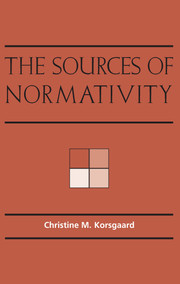Book contents
- Frontmatter
- Contents
- Notes on the contributors
- Acknowledgments
- Introduction
- Prologue: Excellence and obligation a very concise history of western metaphysics 387 bc to 1887 ad
- 1 The normative question
- 2 Reflective endorsement
- 3 The authority of reflection
- 4 The origin of value and the scope of obligation
- 5 Reason, humanity, and the moral law
- 6 Morality and identity
- 7 Universality and the reflective self
- 8 History, morality, and the test of reflection
- 9 Reply
- Bibliography
- Index
8 - History, morality, and the test of reflection
Published online by Cambridge University Press: 20 May 2010
- Frontmatter
- Contents
- Notes on the contributors
- Acknowledgments
- Introduction
- Prologue: Excellence and obligation a very concise history of western metaphysics 387 bc to 1887 ad
- 1 The normative question
- 2 Reflective endorsement
- 3 The authority of reflection
- 4 The origin of value and the scope of obligation
- 5 Reason, humanity, and the moral law
- 6 Morality and identity
- 7 Universality and the reflective self
- 8 History, morality, and the test of reflection
- 9 Reply
- Bibliography
- Index
Summary
THE NORMATIVE QUESTION
Korsgaard says that the normative question (which I shall label [N]) is necessarily formulable in different ways. It may be helpful to her argument to spell out more fully the relations between some of the formulations. For instance, there are significant differences between [N1] ‘What justifies the claims that morality makes on us?’ (1.4.3), and [N2] ‘Is there anything we must do?’ (1.1.1, 1.3). [N2] is at least broader than [N1], since there are non–moral forms of normativity. Korsgaard accepts this, and indeed uses the notion of means–end normativity to elucidate (via the idea of the will's relation to itself) the moral sort of normativity. But this does not seem to allow enough for non–moral forms of normativity (prudential, aesthetic, etc.) which, like the moral sort, can equally give trouble with inclination. It is not entirely clear to me whether Korsgaard thinks that there is a problem about the nature of normativity before we ever get to the specifics of morality. (Perhaps there is a Kantian preconception hovering here, in the idea that it is only the opposition of morality to inclination that really puts the nature of normativity on the line.)
I take it that the reflective question [R] ‘Can morality survive reflection?’ provides a way of approaching [N1] ‘What justifies morality's claims on us?’ But [N1] and [R] line up neatly with each other only if two things are granted.
Information
- Type
- Chapter
- Information
- The Sources of Normativity , pp. 210 - 218Publisher: Cambridge University PressPrint publication year: 1996
Accessibility standard: Unknown
Why this information is here
This section outlines the accessibility features of this content - including support for screen readers, full keyboard navigation and high-contrast display options. This may not be relevant for you.Accessibility Information
- 10
- Cited by
